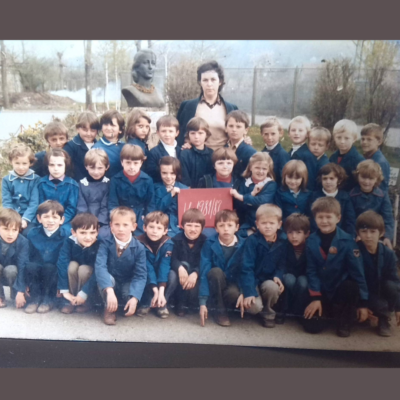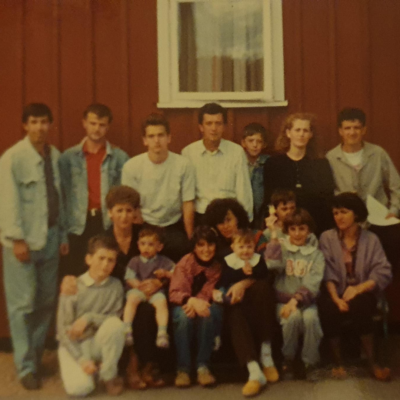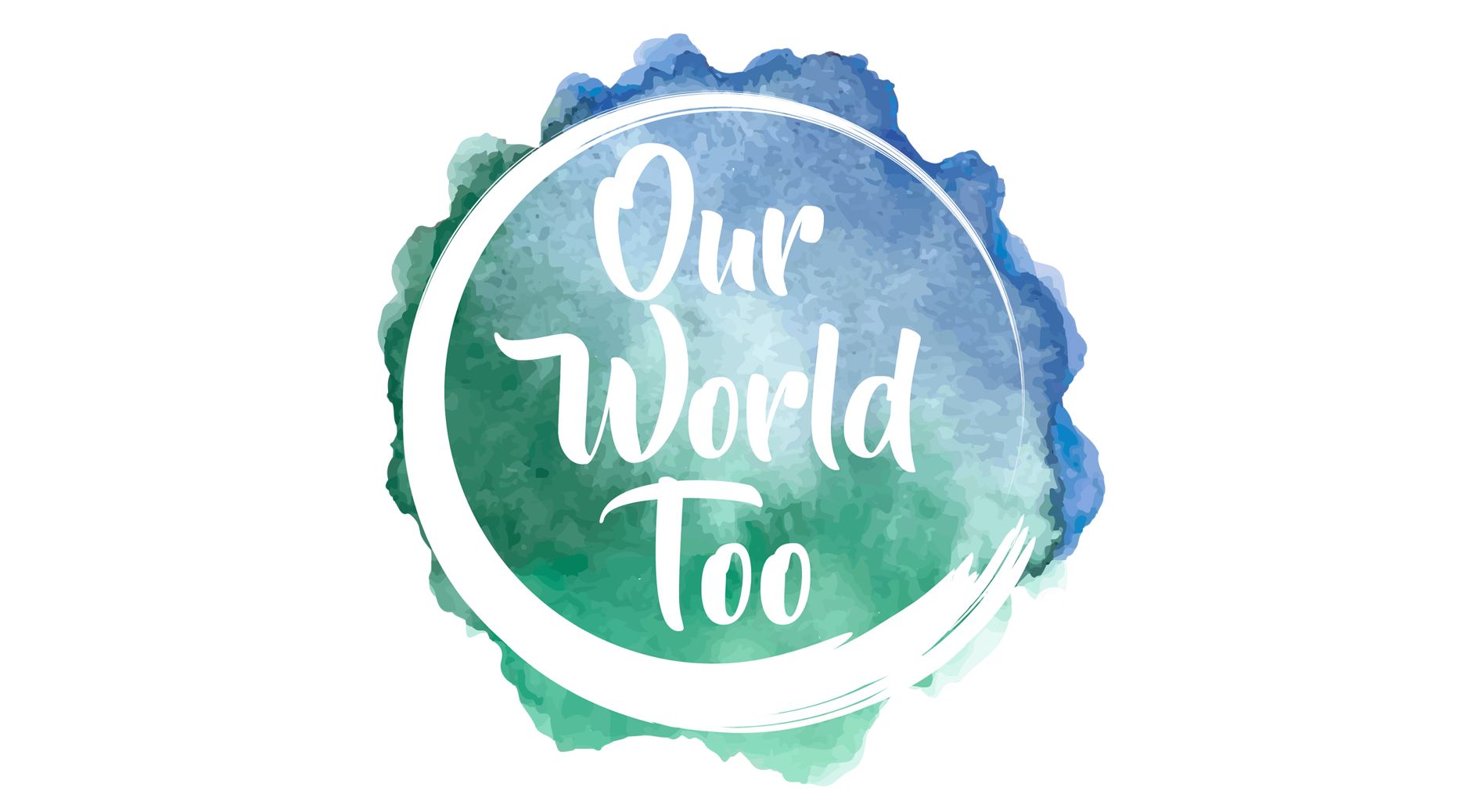That’s where you feel the ethnic cleansing, in the silence
I remember when I heard the Gulf War had started in the late 80s, my immediate reaction was, This could never happen here. Growing up in Tito’s Yugoslavia, we were taught we had the purest form of brotherhood and unity and the notion of war always felt like the stuff from old films. We had to pledge allegiance to the flag and to Tito. I’m not Yugo-nostalgic, but I have vivid memories of this. We believed we overcame some imagined tribalism of the past, which is generally the ground of nation-building. That’s the spirit we grew up with.
It was a shock for most of us when the war started.

Adnan’s elementary school in the early 80s
In my young mind, it felt like the war had started out of nowhere, but this obviously wasn’t the case. War takes time to prepare. Even when it was raging in all its bizarre forms, and we watched the notions of brotherhood and unity crumbling around us, many of us were in denial, as if we would wake up any time to our old lives. When I woke up to the reality of war, I remember I started to develop paranoia. Suddenly you couldn’t trust anything. No one was a friend.
I was reminded of this experience when I visited the Holocaust Memorial in Berlin. Its architecture, with all those intersecting corridors, brought back that feeling of danger being around every corner. You distrust your neighbours. Sometimes even your family. The romantic picture of the world I grew up in was quickly erased. What a reality check.
There were stages to the Bosnian Genocide, and the tactics used by the Serbs varied from city to city.
The war in Croatia started before the aggression on Bosnia. By then, the Serb nationalists had taken over the JNA (Yugoslav Armed Forces) and were drafting Bosnians to join the war in Croatia. They drafted me too, even though I wasn’t yet 18. They tried to sell it to us as if the JNA were fighting in Croatia, but we knew the Serbs were running it. My parents and anyone else who refused to fight were labelled as traitors and lost their jobs.
There were stages to the Bosnian Genocide, and the tactics used by the Serbs varied from city to city. The tactics used in my hometown Banja Luka were different from other places in Bosnia. Banja Luka was supposed to become the capital of the new creation that would be called Republika Srpska, so they didn’t want to destroy it. They cut our electricity and telecommunications and spread propaganda on TV and radio stations. Destroyed the mosques and robbed and killed some people. There was a camp where they took the people they picked up from the streets.
Our Serb classmates told us they had weapons and we wondered how they got them. They were being armed while Bosniak’s and Croat’s who had pistols and hunting rifles had those confiscated.
The ethnic cleansing built slowly, from continuous harassment to beatings and concentration camps being built around Banja Luka. They cut us off from everyone else. We were a few miles from other towns, but we had no way of knowing what was happening there. My mum’s hometown Kotor Varoš was some 40 kilometres from us, and we used to visit our family frequently during the holidays, but we had no idea what was happening to them when the war started. We heard rumours of houses being burnt down, women being raped, and people being thrown in concentration camps.
We had no way of knowing for sure what was happening until one day my aunt came to Banja Luka in an ambulance. She told us my uncle was in a concertation camp and that she had been raped. A Serb nurse had helped her and said she needed medical care in a hospital in Banja Luka. They had a day pass to visit Banja Luka and then they had to return. Eventually, they escaped to South-East Bosnia. When we all met in Sweden in 1996, we found out more about the extent of the crimes committed. German courts established genocide was committed in Kotor Varoš as well as a few other places, not just in Srebrenica, which was the verdict of ICTY.
People tend to forget that in war zones, the boring mundane part of life continues too. People who’ve lived through bombings in Syria and Palestine will tell you this. Amidst all the destruction you still must live.
People tend to forget that in war zones, the boring mundane part of life continues too. People who’ve lived through bombings in Syria and Palestine will tell you this. Amidst all the destruction you still must live. The Serbs understood this and made our life so unbearable it made people want to leave. It was like they wanted it to look like we left to become gastarbeiters (guest workers). They promised safe passage out of the country if you signed your property over to them. Serb refugees from Croatia and other parts of Bosnia populated the areas that were ethnically cleansed. Some Bosniaks tried to stay longer, like my wife’s family, but they were eventually forced to leave too.
When the war started, I was a young man running on the fearlessness of youth and I thought we would be joining the resistance. I grew up reading comic books and I thought I was a superhero. In mid-1993, my family and I were forcibly displaced to Sweden. I was disappointed because I thought we were running away, and I stayed angry at my father for many years after that. It was survivor’s guilt but back then I thought we were cowards. I was excited at the prospect of being able to read more comic books in Sweden, though. War gives you many reality checks.
My wife’s family is from the same part of Banja Luka, but, as I said, they stayed on more than a year longer than we did. Their property consisted of a large house and a smaller house on the same land. They were forced to live in the smaller house and watch as Serbs from Croatia move into the larger one. People were killed in her family, especially those with money. They thought they could wait out the war but eventually they had to leave too because her mother was afraid she would be raped like some of her friends. They escaped to Croatia and then to Sweden.
In the 90s, there weren’t a lot of refugee camps in Sweden and the government had to quickly prepare accommodations for the arriving refugees. They used old military barracks and other similar buildings. In some camps, which had previously been used by refugees from other places, I remember they had these signs instructing us on how you were supposed to use a toilet. Bosnians were furious, thinking, who did they think we were to feel the need to tell us how to use a toilet.

1993 Vårgårda refugee camp
In the first refugee camps, the big ones, we were usually staying in these large rooms in military buildings, with 3 or 4 families living in the same room. After that, we were transferred to cities and towns all over the country, and then, each family would get a flat or two families would share one larger flat.
Those first years, it was a very depressing time because we didn’t know what would happen next. We didn’t know if we would have to go back or stay to learn Swedish and integrate. They used to transfer us between camps every few months. I think they did this so people would think something was happening, to instil some semblance of change and progress. Otherwise, people would start getting impatient, depressed, and loud. Thinking about it now, it seems like an interesting tactic.
Those first years, it was a very depressing time because we didn’t know what would happen next. We didn’t know if we would have to go back or stay to learn Swedish and integrate. They used to transfer us between camps every few months. I think they did this so people would think something was happening, to instil some semblance of change and progress. Otherwise, people would start getting impatient, depressed, and loud. Thinking about it now, it seems like an interesting tactic.
One or two years after our arrival, I can’t remember exactly, the Swedish government decided to give us stay permits and we moved to more permanent accommodations and started looking for jobs.
Before the war, I was studying to become an engineer, but Bosnian qualifications weren’t valid in Sweden. I had to redo my entire high school. Simultaneously, I worked multiple different jobs from pottery to being a care assistant. I worked in a small Swedish town for a while then I moved to Stockholm where I worked as a care assistant for 13 years. I studied Swedish and English. I continued to work as a care assistant during my undergraduate, Masters, and PhD. In 2004, during my PhD, I started working on my first novel and continued to do all these things side by side.
My family didn’t think of going back. My dad was very open about not going back, but in the camps, the zeitgeist was shaped by this desire and this talk about going back and if you weren’t part of the discourse, you were considered a traitor and people said you didn’t love Bosnia. There was a lot of nostalgia in the camps, but most people knew they wouldn’t go back. It was difficult back then. Some young men went back to Bosnia to fight but returned disillusioned about the war and their own abilities.
In 2003 or 2004 as part of the Dayton Agreement, we got our property back. Refugees who had fled to other parts of Bosnia returned to Banja Luka. It was mostly older people who returned though, there were few to no children. My street used to be vibrant, and kids would be playing and fighting, you know, but now it’s mainly old people who’ve returned out of spite or because they were sick and tired of being refugees in other parts of Bosnia. The absence of children is the hardest thing to experience. We renovated our house, but the silence is unsettling. It makes the area feel ghostly, especially the area in Banja Luka where I’m from.
That’s where you feel the ethnic cleansing, in the silence.
It was easy for the Swedish to accept Bosnian refugees because there had been a significant population of Balkan diaspora there since the 70s. They knew Yugoslavia because they’d been there for vacation. However, their treatment of African refugees was different. Nowadays we see the difference in how we were received vs. how for example Syrian refugees are perceived. There is a stereotypical image of a refugee. Preconceived notions of what their story is and how they should behave and what they should look like. In contrast, sometimes people want a unique story. Every story matters, and we need to be open to some having the same experiences and some having entirely different experiences. In addition, I also want to say that a refugee doesn’t need to be a good person to be receive your empathy and help.
From the time we arrived in the 90s and onwards there has been a huge development in the far right. Sweden has changed for the worse.
Generally, the reporting on the Bosnian Genocide, not only in Sweden, was also flawed. Often it was presented as a war between tribes or a religious war. One thing that confused people was the fact that were introduced as Muslim refugees, and despite the fact people knew what the Balkan populations looked like, the fact we were white was confusing.
From the time we arrived in the 90s and onwards there has been a huge development in the far right. Sweden has changed for the worse. It is quite remarkable, for instance, that there was a huge economic crisis in the 90s and they still took us in whereas now anti-immigration sentiment is quite strong. It is true that Ukrainian refugees seem to have been welcomed with open arms since they are perceived as white, Christian people, but I feel much of this attitude has to do with political positioning, how Sweden feels about Russia etc., not because of pure love for refugees. I’m referring to the state politics, of course. Swedish-Bosnians, generally, seem to feel more of a deep affinity and solidarity with the Ukrainians.
Despite the similarities between the aggressions on Bosnia and Ukraine, and our similar experience, the main difference we notice is the fact that our being indigenous, white Muslims has been a consistent problem for Christian Europe.
Despite the similarities between the aggressions on Bosnia and Ukraine, and our similar experience, the main difference we notice is the fact that our being indigenous, white Muslims has been a consistent problem for Christian Europe. We don’t fit. Neo-Nazi and other racist parties have stipulated some kind of essential impossibility of living alongside Muslims. Terrorist attacks such as Breivik in Norway and the one in Christchurch were inspired by the Serb ideologues like Radovan Karadžić.
To me, being a refugee is a life condition. It is like being on that little island in the middle of the road. You know, like on big roads, when you’ve crossed only halfway, and then have to stop for traffic. You’re safe, even though there are cars swishing by on both sides. You cannot stay there permanently, and yet you are stuck.
